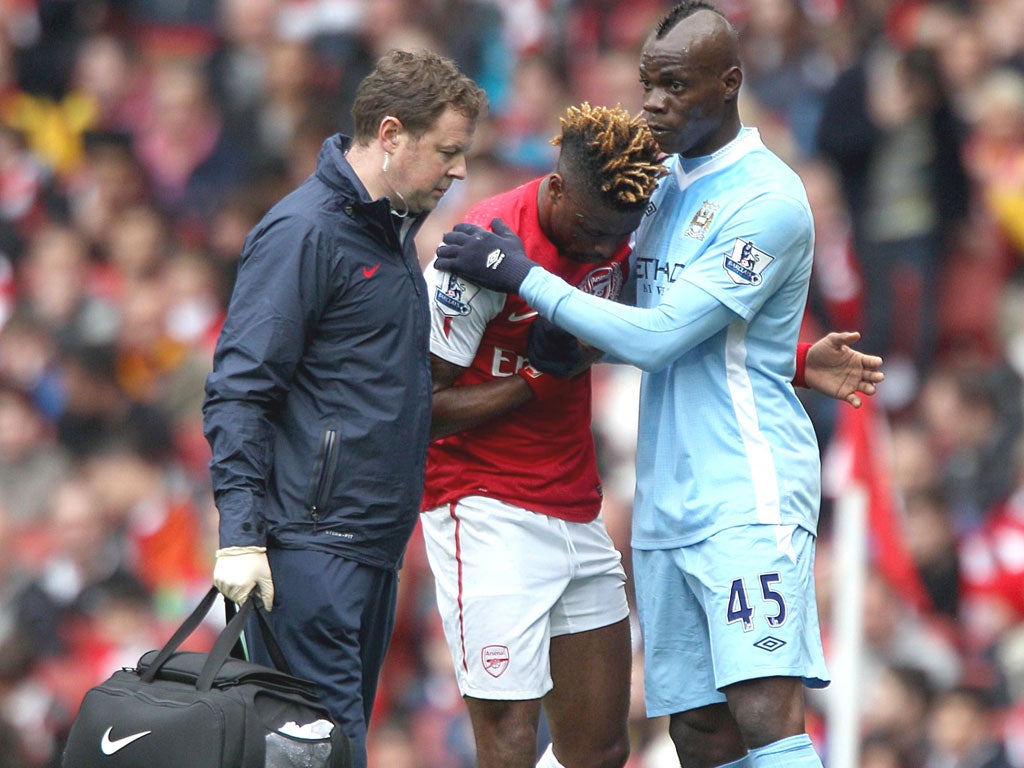
The Football Association's disciplinary system has to change. It did not even take Mario Balotelli's farcical reprieve for studding Alex Song to tell us that; we have known it for a while.
The lack of retrospective action against Balotelli for his foul in Manchester City's game against Arsenal eight days ago fell into the same category as two more infamous let-offs in the last 14 months. In February, Benoît Assou-Ekotto went studs-up on Franco Di Santo in Spurs' home league game against Wigan and, despite the incident being reviewed, got away with it. In February last year Wayne Rooney elbowed Wigan's James McCarthy off the ball and no retrospective action was taken.
In all three cases, the referees in question – Martin Atkinson, pictured, Lee Probert and Mark Clattenburg respectively – gave the same answer to the FA when subsequently asked about the incidents in question. Yes, they saw the flashpoint but they did not see it well enough. Under the letter of the FA law, it cannot go back on any decision the referee saw, however inappropriate his response at the time.
This "I saw it, just not well enough" loophole must be closed.
In the French league a panel-review system is operated: members of the Commission de Visionnage watch every one of the 20 games played in Ligue 1 and Ligue 2 each weekend and refer any key incidents they do not feel have been properly dealt with by the referee to the league's Commission de Discipline.
English football has four professional leagues, all of which have to be treated equally. That is 46 games a weekend, more than half at grounds where limited television camera coverage means there cannot be the same level of scrutiny as in the top divisions. That matters. Equality under the laws of the game is fundamental.
The FA has taken a bucket-load of criticism for its inability to pursue Balotelli and for the failure to rescind Shaun Derry's red card against Manchester United. It has largely escaped attention that it was not the FA but a three-man independent panel who heard Derry's appeal. Senior figures at the FA were perplexed at the decision.
The French have pushed further ahead with retrospective action than any other European football nation. The English FA tried to do the same eight years ago and was slapped down by Fifa, which has a general policy against what it terms the "re-refereeing of games". Since then, the FA has tended to be more conservative and seek approval from the world governing body first. That could yet change.
The French have a system in place where yellow cards can be upgraded into one-, two- or three-match bans. Why is it always a three-match ban in England? Chiefly because that is what the clubs wanted. They have consistently told the FA that they favour a fixed tariff for a straight red card rather than the uncertainty of a player going before a panel. Which means that a silly, heat-of-the-moment red card like Gervinho's against Newcastle this season earns the same punishment as a leg-breaking tackle.
If English football were to adopt a sliding scale rule on bans for red card offences, it would be swapping one set of problems for another. The body responsible would have to decide that if, for instance, Nigel de Jong's leg-breaking tackle (a red card at the time) on Hatem Ben Arfa in October 2010 was worth, say, an eight-game ban, then how much for Yohan Cabaye's crafty studding of Jay Spearing in December last year (no card at the time)?
The arguments will never stop. The administration costs will be enormous. Plainly, however, something has to change. The current system is undermining what are, on the whole, fine match officials.
Join our commenting forum
Join thought-provoking conversations, follow other Independent readers and see their replies
Comments